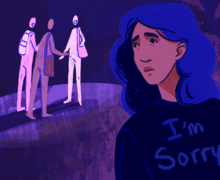CNY Playhouse celebrates inclusivity in classic thriller ‘Wait Until Dark’
Courtesy of Amelia Beamish
Maria R. Mucaria plays the role of Susy Hendrix, a blind woman who uses her disability to her advantage when intruders break into her apartment in CNY Playhouse's production of "Wait Until Dark."
UPDATED: Jan. 13, 2020 at 10:30 a.m.
Maria R. Mucaria had always admired the world of theater. However, being legally blind, she could never picture herself as a leading lady.
“Hollywood doesn’t always reflect reality,” Mucaria said. “I was not seeing people with disabilities involved in the world. So, I said, well, that’s not where I want to be.”
But since being cast as Susy Hendrix in the CNY Playhouse rendition of “Wait Until Dark,” her outlook has changed. The show revolves around Susy, a blind woman whose apartment is infiltrated by con-artists. To defend herself and succeed in escaping, Hendrix uses her visual impairment to her advantage.
Kathy Burke Egloff, the producer of the show, said the show’s intricate plot keeps the audience in suspense.
“It’s definitely a thriller, but not a thriller in the same sense as Hitchcock was,” she said. “It does have its definite twists and turns, and it’s very interesting to watch it unfold.”
“Wait Until Dark” was originally written in the late 1960s. It premiered on Broadway before becoming a major motion picture starring Audrey Hepburn. Since then, “Wait Until Dark has become a theatrical classic, and now it’s hitting the Syracuse theater scene. The show premiered this past weekend and will run through Jan. 25.
Director Kassandra Melendez-Ramirez said she wanted to put on the show because of its story of resilience and the opportunity to put on an inclusive performance.

Mucaria worked with director Kassandra Melendez-Ramirez and fight-choreographer Alyssa Otoski-Keim to help the entire production create a more practical depiction of living with disability. Courtesy of Amelia Beamish
“My director’s vision for this is that sometimes in life we have things that happen that we can’t control,” she said. “It’s a story for everyone in terms of fighting. The thing that you can control is making the choice to fight back.”
Unlike the character she plays, Mucaria was born with a visual disability.
The character of Hendrix lost her sight in a car accident, and for the part, Mucaria dove into research to understand how a car accident could cause blindness. She also consulted with people like her husband, who came into blindness at a later age.
While their experiences in acquiring blindness were different, Mucaria felt like their mental struggles and journey through their disability were similar. She said due to her disability, she often felt dismissed or tended to second-guess herself.
“[Susy] is a little bit too trusting of others because she doesn’t trust herself,” said Mucaria. “So, I had to learn how to trust myself better and use that bit of confidence to bleed into the character.”
Mucaria’s experience with disability also helped to bring more realistic actions to the show. Melendez-Ramirez said that Mucaria’s perspective helped the entire production create a more practical depiction of living with disability.
For example, Melendez-Ramirez brought in fight choreographer Alyssa Otoski-Keim to make sure any violent scenes were performed safely. Mucaria said that she would suggest moves and actions that someone with a disability might consider performing.

Director Kassandra Melendez-Ramirez said she wanted to put on “Wait Until Dark” because of its story of resilience. Courtesy of Amelia Beamish
“When people approach how they think blind people do things, they don’t always realize it’s maybe not how it works,” Mucaria said. “So, I was glad that [Melendez-Ramirez] gave me a little bit of freedom to let her know how I would normally achieve something like this.”
Melendez-Ramirez was particularly interested in creating a show that involved a diverse amount of gender and ability. Besides Mucaria’s realistic portrayal of visual impairment, Melendez-Ramirez also changed the gender of one of the intruding con-artists. Mac Talman, played by Chelsea Lembo, was originally Mike Talman, a male supporting role.
The director said that during casting, she felt that the part could be played by anyone, no matter the original assigned gender.
“I just really wanted a different perspective for that character,” Melendez-Ramirez said.
Mucaria said he hopes anyone with a disability who watches the show can take away the message that independence is still within reach.
“I want people to realize that having a disability shouldn’t make you feel like you’re less of a person,” Mucaria said. “We all want to contribute to society in some way, and there is life after disability. Independence is still within a grasp within someone’s life within disability.”
CORRECTION: In a previous version of this post, Maria R. Mucaria was misquoted. The Daily Orange regrets this error.
Published on January 13, 2020 at 1:11 am
Contact Amy: abnakamu@syr.edu





